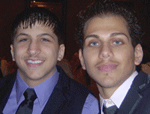With the rate of kidney disease up dramatically over the past 20 years according to the National Institute of Diabetes and Digestive and Kidney Diseases, it’s no surprise that the national waiting list for transplants is long.

|
|
Raeda Haidar, L, her son Rami Haidar and his kidney donor Sherry Lodwig have become good friends since Rami’s operation. But Rami’s brother Mohamed still needs a suitable donor with the hard-to-find type-A blood. Pictures courtesy of Rami Haidar |
And for 21-year-old Rami Haidar of Dearborn Heights, the wait figured to be an agonizing one. He’d been placed on the list after contracting kidney disease from due to a rare genetic disorder called Aport Syndrome. Rami needed dialysis treatments and eventually a transplant. He waited for about two and a half years but was still about five years away from a new kidney.
That could have meant five more years of constant hospital visits and of draining, frustrating, and at times painful dialysis treatments.
But then in January 2009, Haidar’s mother Raeda got a call that changed everything. It was from a casual friend of her brother and local realtor Ali Charara named Sherry Lodwig, a front desk worker at Body Blitz Fitness, formerly Gold’s Gym, in Dearborn.
“She called to tell me she would be the donor for Rami; she made me cry,” Raeda Haidar said.
Rami’s condition had come up in their various talks with Charara, and Lodwig had expressed concern and wondered how she could help.
“She said she couldn’t sleep at night thinking about his condition,” Raeda Haidar said. “She wanted to help.”
Lodwig had the hard-to-find type-A blood, the perfect match for Rami. She had to undergo eight months of testing on and off before she was deemed compatible with Rami, but in her mind, it was a small price to pay for the opportunity to potentially save a life.
And in the mind of Raeda Haidar there was no better gift anyone could have given her family.
“A woman who gives my son a kidney, she’s more than family, I can’t thank her enough,” she said.
On July 15th, 2009 Rami received his kidney, and Lodwig visited him in the hospital for support, just as the Haidar family had done for her when she underwent her own surgery.
Lodwig had gotten to know Raeda Haidar and her family well in the days leading up to the surgery through lunches and other visits, and for her, seeing Rami Haidar pull through made it all worthwhile.
“They made me part of the family, they’re wonderful people and they treated my husband and me like gold,” Lodwig said. “It really makes you feel good to donate; I felt like I was on cloud nine for a while. I’d do it all over again.”

|
|
Brothers Mohamed (left) and Rami Haidar were both diagnosed with Alport Syndrome, a rare disorder that causes kidney disease. Rami Haidar said the disease has strengthened their bond. |
Rami’s 17-year-old brother Mohamed also has Alport Syndrome, which doctors said is a one-in-a-million type of disorder, and remains in need of a kidney donor.
Mohamed underwent a transplant operation on August 15, but things took turn a turn for the worse when his body rejected it.
“When I got the call from my husband, it was the worst day of my life,” said Raeda Haidar.
To go from what could have been a perfect ending to watching Mohamed struggle bedside at the hospital was beyond difficult for Raeda, but she remains hopeful that another donor will step up and help out.
One prospective donor bailed on a meeting with Raeda, but she’s keeping the same faith that got her through her other son’s ordeal and hoping someone new will step up.
“People are scared to donate but they don’t have any idea; they don’t know what people go through,” she said.
Mohamed Haidar was forced to stay home from Crestwood High School last year because of his condition, and doctors have said that it’s possible he may have a heart attack by age 25 if he doesn’t receive a new kidney, among other expected complications and countless painful hours spent at Harper Children’s Hospital in Detroit.
Lodwig said the surgery for kidney donation wasn’t nearly as bad as people make it out to be in her case. She thanked her husband John for standing by her and being supportive and said she’s back to normal now.
“For the first two weeks I felt crummy and sore, but other than that and a four-inch scar I’m fine,” she said. “I still do normal stuff around the house and I’m back to working the front counter at the gym.”
Rami Haidar, who’s been feeling fine since the surgery except for a few medication-related side effects, tried to explain how much Lodwig’s sacrifice helped him.
“I don’t know how in words I can express how much I appreciate it,” he said.
Rami is attending Henry Ford Community College in Dearborn and plans to study pharmacy.
But for now, his main focus is on helping to find his brother a kidney of his own so he can get on with his life.
The brothers’ health problems have also strengthened their bond.
“It does bring us together, and when I heard his kidney was rejected it was probably the saddest day in my life,” he said.
“I don’t know want to see my brother going through this anymore.”
For those who are in good health with type-A blood and wish to help, Mohamed Haidar’s mother Raeda is only a phone call away. Her number is 313.529.1001 and she looks forward to one day meeting another donor as unselfish and kindhearted as Lodwig.
“She could have picked anyone but she picked us, to me, she is our angel,” she said.






Leave a Reply